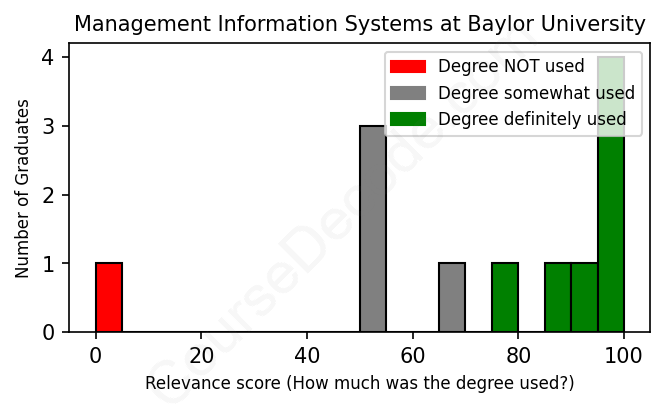
First, some facts. Of the Management Information Systems graduates from Baylor University we've analyzed , here's how many have used (or NOT used) their degree in their career:

These are estimates based on AI analysis of 12 LinkedIn profiles (see below).
The verdict? Above average. Overall, with an average relevance score of 73%, Management Information Systems graduates from Baylor University have a higher likelihood (+6%) of finding work in this field compared to the average graduate across all fields:
And for comparison, here's the chart for all profiles we've looked at across all degrees.
Also, after graduating, only 8% of these graduates have pursued further education other than another Bachelor's degree (such as a Masters degree or other), compared to the average across all profiles of 35%. This suggests a Bachelors degree is enough for most Management Information Systems graduates, and it's normal to look for work straight after graduation.
See the details:
|
Relevance score: 92% We think this person has gone into a career highly relevant to their degree. We think this person has gone into a career highly relevant to their degree.
DEGREE INFOGraduated in 2015 from Baylor University with a Bachelor of Business Administration (B.B.A.) in Management Information Systems. No other secondary education since. JOB HISTORY SINCE GRADUATIONServer Heitmiller Steakhouse Feb 2015 - Oct 2015 Software Engineer  USAA Jan 2016 - Jun 2021 Developer Evangelist  BillGO Jun 2021 - Present ABOUTNo information provided. |
The top 10 most common jobs done by the graduates we've analyzed (ranked most common to least) are:
From the analysis of LinkedIn profiles of Baylor University graduates with a degree in Management Information Systems, it’s clear that many of them have landed in various roles that either leverage their knowledge directly or indirectly. Common job positions include Software Engineers, Cyber Security Consultants, and Implementation Consultants. These roles generally align well with the skill set learned in an MIS program, emphasizing technical expertise and analysis rooted in managing and securing information systems. For instance, a significant number of graduates found positions that directly utilize their technical skills, such as cybersecurity and software development, which are definitely relevant to their studies.
However, not all jobs held by these graduates are inherently tied to Management Information Systems. Many graduates took on roles in finance and compliance, such as credit analysts and regulatory compliance managers, which while may benefit from some information systems knowledge, don't directly align with the core competencies of the degree. Positions like serving at a restaurant or purely sales-focused roles, like a Business Development Associate, also appeared, showing that not all career paths for these graduates strictly adhered to their major. In summary, while there are solid examples of highly relevant positions, there’s also a noticeable number of jobs that diverge from the MIS path—highlighting the diverse opportunities available but also suggesting that some graduates might not fully utilize their educational background in their professional journeys.
Here is a visual representation of the most common words in job titles for Management Information Systems graduates (this is across all Management Information Systems graduates we've analyzed, not just those who went to Baylor University):

After analyzing the career trajectories of Baylor University graduates with a degree in Management Information Systems, it’s clear that many of these individuals have found themselves in relevant and promising roles right out of college. For their first jobs, a lot seem to gravitate towards positions like software engineering, consulting, and various analyst roles. For instance, grads from the Class of 2020 are working as implementation consultants and systems administrators, while those who graduated more recently are stepping into business analysis and development roles. This indicates a strong initial alignment with the skills learned in their MIS programs.
Looking a little further down the road, like five to ten years later, these graduates often ascend into more advanced positions. Many of the earlier graduates have moved into senior management roles or specialized consultant positions, particularly in sectors related to compliance, cyber security, and finance. It appears that a solid portion of these alumni are thriving in high-demand areas such as cyber security and regulatory compliance, which are not only relevant to their studies but also lucrative fields. Overall, it seems that Baylor’s MIS program sets up its graduates well for a successful career path, with many staying in tech-related roles, advancing steadily, and finding themselves in positions of responsibility within recognized companies. They seem to be translating their education into successful careers, which is definitely a good sign for prospective students considering a similar path!
Honestly, a Bachelor’s degree in Management Information Systems (MIS) at Baylor University can be a bit of a mixed bag in terms of difficulty. It’s not the easiest degree out there—since it blends tech stuff with business concepts, you’ll be crunching numbers, analyzing data, and learning about systems that help organizations run smoothly. If you have a knack for problem-solving and a decent understanding of computer basics, you might find it manageable. But if math and tech aren’t your strong suits, it might feel a bit challenging. Overall, it’s about average in terms of difficulty, with some classes being easier and others requiring more effort, depending on your strengths and interests. So just be prepared to put in some work, but know that it can definitely be done!
Most commonly, in the LinkedIn profiles we've looked at, it takes people 4 years to finish a Bachelor degree in Management Information Systems.
So, looking at these Baylor graduates, it seems like most of them have landed pretty decent jobs that likely pay well. The ones from 2012 and 2015, especially, moved up to serious roles in regulatory compliance and software engineering, which can both pull in some good salaries. The recent grads from 2022 and 2023 are still starting out, but they’re already in analyst and developer roles, which are usually pretty lucrative right off the bat. Overall, it looks like these folks are on a solid path towards making good money in their fields, especially with the demand for tech and compliance roles these days.
Here is a visual representation of the most common words seen in the "about" section of LinkedIn profiles who have a Bachelor degree in Management Information Systems (this is across all Management Information Systems graduates we've analyzed, not just those who went to Baylor University). This may or may not be useful:

Here are all colleges offering a Bachelor degree in Management Information Systems (ordered by the average relevance score of their Management Information Systems graduates, best to worst) where we have analyzed at least 10 of their graduates:
| College | Score | Count |
|---|---|---|
 The University of Alabama The University of Alabama
|
93 | 18 |
 The University of Georgia The University of Georgia
|
84 | 12 |
 University of South Florida University of South Florida
|
83 | 10 |
 University of Alabama University of Alabama
|
83 | 19 |
 San Jose State University San Jose State University
|
79 | 16 |
 University of Maryland Baltimore County University of Maryland Baltimore County
|
79 | 10 |
 University of Georgia - Terry College of Business University of Georgia - Terry College of Business
|
77 | 18 |
 University of Arizona University of Arizona
|
76 | 14 |
 Penn State University Penn State University
|
73 | 11 |
 Ohio University Ohio University
|
73 | 10 |
 Oklahoma State University Oklahoma State University
|
73 | 17 |
 Baylor University Baylor University
|
73 | 12 |
 University of Houston, C.T. Bauer College of Business University of Houston, C.T. Bauer College of Business
|
73 | 20 |
 Texas A&M University Texas A&M University
|
70 | 10 |
 The University of Texas at Austin The University of Texas at Austin
|
68 | 12 |
 University of Houston University of Houston
|
68 | 19 |
 East Carolina University East Carolina University
|
64 | 11 |
 Washington State University Washington State University
|
64 | 14 |